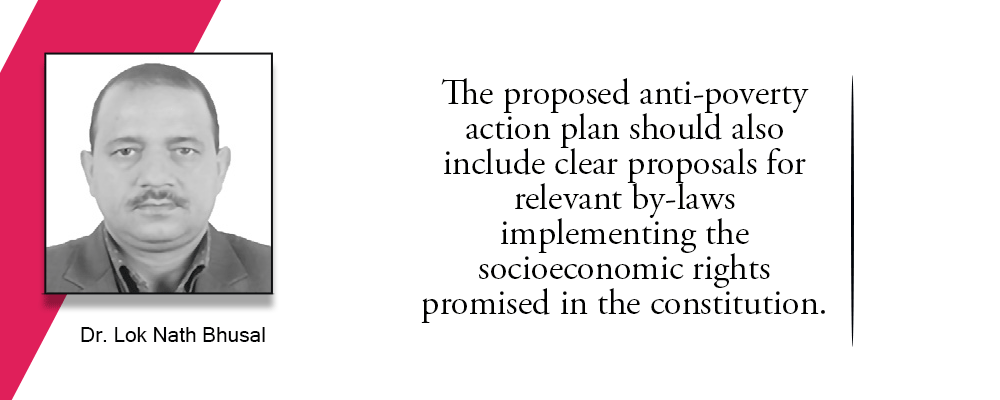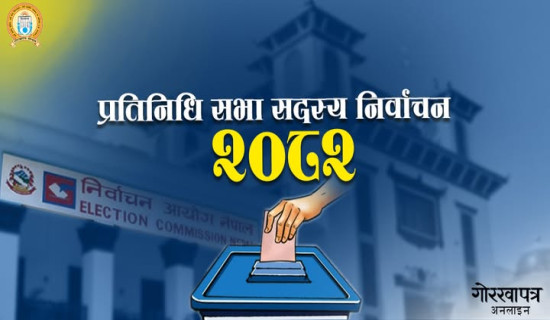- Sunday, 1 March 2026
Poverty Imperils Human Rights
Poverty is around and it demands concrete actions of various governance actors. Government has a critical role to play. Nepal’s poverty reduction is impressive, but only on the basis of some chosen measure. How poverty is conceptualised and defined determines our efforts to tackle and assess it. Globally, monetary and multi-dimensional measures are in use to assess the extent of poverty. Development is all about bringing light and happiness in everyone’s life. No one should be left behind in poverty. Poverty is not only material deprivation. It is also understood as absence of human rights. Poverty seriously undermines human rights. They are mutually reinforcing. The UN appoints a special rapporteur to access poverty from the human rights angle.
Recently, the UN rapporteur recommended that the Nepal government prioritise specific issues to improve poverty reduction and human right situation in the country. The rapporteur packs poverty and inequality together while making his recommendations for tackling these persisting problems. He asks the government to make concerted efforts to eradicate poverty and such efforts, according to him, must be guided by more comprehensive data gathering, including that of disability. This highlights the need for data to formulate and assess anti-poverty and inequality-reducing policy and programmatic interventions that are evidence-based. Adequate database also helps better targeting which lowers costs and increases expected results.
Accurate estimates
The rapporteur states the need for producing more accurate poverty estimates. This is particularly important at a time some poverty researchers have argued that the existing official poverty estimates undermine the true nature and extent of poverty in the country. Surveys can both illumine and hide the reality. It has been suggested that the government must develop an anti-poverty action plan based on recent disaggregated data which are more realistic. This demands for more specific interventions targeted at the most deprived and excluded groups in our society where the pockets of poverty still remain.
It has been recommended that the anti-poverty plan should include a clear strategy for increasing employment opportunities and providing vocational training, especially to women and marginalised communities in order to check outward migration and its worst impacts, including debt bondage, dependence on remittances and potential exploitation abroad. For this to happen we must generate more and better domestic employment and self-employment opportunities, and improver migration governance. This will help break the vicious cycle of foreign employment-remittances-imports, and create a self-sustaining economy as envisioned by the constitution of the country.
It has been further recommended that the proposed anti-poverty action plan should also include clear proposals for relevant by-laws implementing the socioeconomic rights promised in the constitution. It is in the context that 31 fundamental rights have been granted by the constitution and relevant laws have also been formulated but their implementation have remained weak due to the absence of clear implementation modality which must be spelled out by relevant by-laws. The report has further recommended for developing a mechanism to ensure that all the bills presented for adoption in the parliament are screened for their compatibility with fundamental rights and have their impacts on particularly disadvantaged groups assessed.
This recommendation is broadly in line with the policy of carrying out legal reforms for ensuring more inclusive, pro-poor and rights-based development. Although discrimination along with various lines has dropped significantly over the years, the UN rapporteur has recommended the need for intensification of efforts to combat discrimination. He has emphasised that the access to genuinely free, high-quality education must be guaranteed, protection from discrimination in private employment should be ensured and the reservations policy should be better enforced to achieve a higher representation of disadvantaged groups.
This recommendation should be understood against the ground reality that most of the reservation benefits have been captured by the elites. An economic vulnerability-based reservation will certainly lead to desired outcomes and make it pro-poor. It has also been observed that some backward community candidates have also started to be selected in open competition, suggesting for an immediate revision of the reservation system.
The rapporteur has also recommended for ensuring inclusive land ownership and ending persisting bonded labour and prospects for women’s development by reversing century-old counter-productive patriarchal norms. Going further deep to the roots of poverty and inequality, the UN report stresses on implementing policies encouraging girls’ school attendance and facilitating women’s access to health care, employment opportunities and land ownership. It has also been stressed that children should be better protected and child marriage and child labour must be effectively abolished. These bad practices have been considered as rooted in various forms of poverty.
Social protections
What is special about the recommendation is the case that the report has recognised a clear connection between poverty and social protection. It has been stressed that more labour and social protections should be afforded to both formal and informal workers, improve labour inspection, and improve the minimum wage fixation and adjustment procedures through legal and institutional reforms. Non-take-up, overlapping and duplication in the provision of social protection benefits needs to be overcome to reduce the increasing trend of public expenditure on about 87 ongoing social protection schemes.
Timely vital registration and update, localised information dissemination about social security benefits, integrating various such schemes and panalising corrupt practices in this area are other relevant recommendations to make social protection more and more pro-poor and rights-based. Increasing children-based social protection and enrolment levels in the contributory schemes provided by Social Security Fund, improving the Prime Minister Employment Programme through more localisation and feminisation, and intensifying monitoring, communication and transparency in all the social protection governance are other noteworthy and doable recommendations by the UN rapporteur. The government needs to take these holistic recommendations into account and act swiftly to improve human rights and overcome poverty.
(Dr. Bhusal is an expert in poverty, employment and social protection.)
















